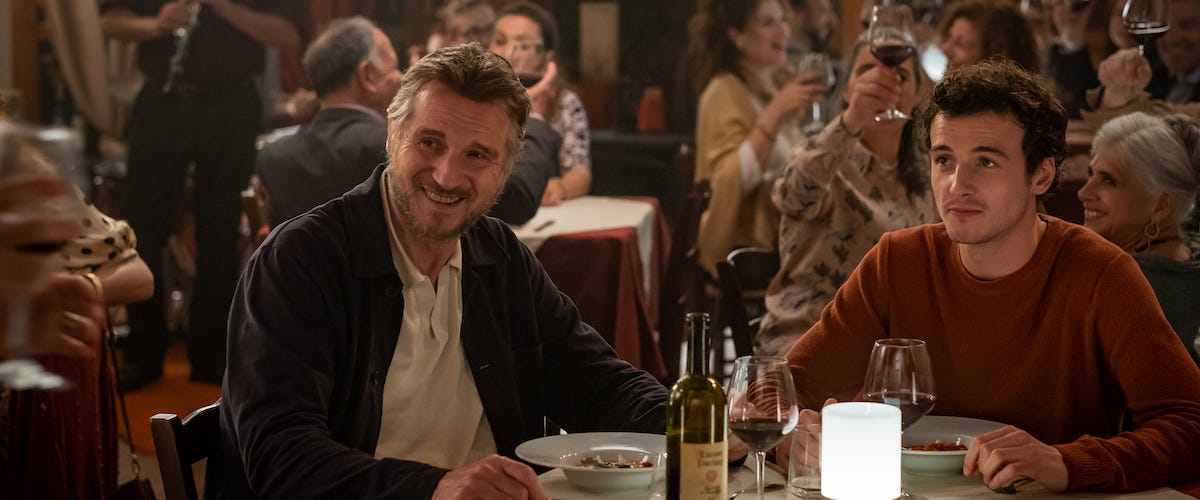Made in Italy

There are plenty of films surrounding the estrangement of fathers and sons, but somehow "Made in Italy" takes this well-worn trope and makes it feel fresh and different.
Maybe it's the way that it's a home-improvement project brings Robert (Liam Neeson) and Jack (Micheál Richardson) together.
Or maybe it's the meta nature of the film--Neeson's real-life wife Natasha Richardson--Micheál's mother--died in a skiing accident in 2009.
Either way, "Italy" is an effective drama, whose emotional punch is equalled by the whimsy with which it rolls through its narrative.
The story, in brief: dad and son each own half of the family home, owned by Robert's wife, Jack's mother, who died in a car accident years before. Dad and son didn't know how to connect to each other, but while Jack was unable to replicate his father's success as an artist, he became a somewhat successful art gallery manager (which is owned by the family of his own estranged wife).
But Jack is having marital problems and wants to sell the home so he can buy the gallery, finally showing his dad that he can be a success in his field, having for years felt like a pale imitation. But the home has fallen into disrepair, and will take time and money to renovate, time Jack doesn't have.
And what a mess it is, from the rust in the water pipes to the garish red mural painted on one of the walls to overgrown weeds and cracking plaster. It's a money and time pit that has good bones, but isn't going to be a quick flip.
Of course, their animosity will slowly strip away like so many layers of paint, and their vulnerable centers will inevitably be revealed. This is no spoiler and is hardly a secret.
Writer/director James D'arcy, an actor making his feature debut, lets this play out without the macho posturing he could have in a film of this nature. There are no actual fisticuffs between Jack and Robert, just the remnants of arguments past, and the deepest hurt a parent and child can feel--when they've wounded each other.
That's not to call this a wholly original film--there's a very "How Stella Got Her Groove Back" feel to the film, albeit with genders reversed, down to the prove-it-to-pops main narrative thread, the burgeoning romance with a local townie, and the realization that the inside of your own head is the true lair of the beast.
Neeson and Richardson have a natural awkwardness together, and you can imagine them, if not airing old grievances between them, finding some sort of catharsis given the similarities between the relationship of their characters to the actors. It gives a natural added layer to the film and makes it that much more effective.
Of course, Neeson is a stalwart, and is as natural and effortless as he typically is. There's a tremendous sequence where Jack questions his father's love for the home, having let it fall into disrepair. As Robert and Jack sit outdoors against a sweeping, epic view, Jack questions whether his father even cares about the beauty behind him. Robert proceeds to describe the view in splendid detail, his back to the vista the entire time. It's perhaps the first time Robert reveals a true love for the home beyond the mere pain at the prospect of giving it up.
Richardson is solid as well, and his romantic arc with Natalia (Valeria Bilello), a local restauratuer, is inoffensive if not outright charming. There's a sense for a moment that there might even be romantic tension, with Jack and Robert vying for her affections, and in a lesser film there would have been; but here Robert is allowed to be a real father, perhaps recognizing an opportunity for his son.
"Made in Italy" is a good film, one made with a compassionate touch and that unspools in a naturalistic, easy way, with the feel of a relaxing family vacation, even if those family members have deep-seated dysfunction. We know where the journey is going, but the scenery is so lovely, and the endpoint so warm and inviting, that we don't mind a little yelling.


